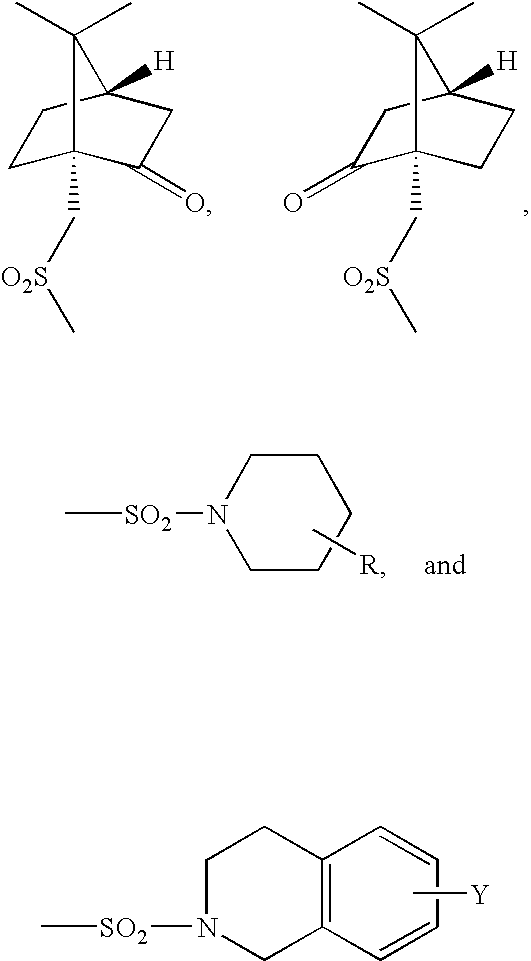3-piperidinylisochroman-5-ols as dopamine agonists
a technology of dopamine agonist and piperidinylisochroman, which is applied in the direction of biocide, cardiovascular disorder, drug composition, etc., can solve the problems of reducing the effect of treatment, and no antidepressant drug to date can substitute for electroconvulsive shock therapy
- Summary
- Abstract
- Description
- Claims
- Application Information
AI Technical Summary
Benefits of technology
Problems solved by technology
Method used
Image
Examples
example 1
[0454]
2-Methoxy-3-methylbenzaldehyde
Scheme A, Starting Material
[0455] Dissolve 2-hydroxy-3-methylbenzaldehyde (80 g, 0.588 mol) in 350 mL DMF and warm at 50°. Add potassium carbonate (97.4 g, 0.705 mol), follow it by the dropwise addition of iodomethane (125 g, 0.881 mol). After one hour at 50° C. the reaction mixture was allow to cool to room temperature and add 700 mL of water. Adjust the pH to 7 with 3N HCl and then extract the mixture two times with 350 mL of ethyl acetate. Wash the combined organic layers with brine and dry (Na2SO4).
[0456] Remove the solvent to give 87.9 g (99.9%) of 2-methoxy-3-methylbenzaldehyde: 1H NMR (DMSO-d6) δ 10.25 (s, 1H), 7.60 (m, 1H), 7.20 (m, 1H), 3.85 (s, 3H), 2.28 (s, 3H).
example 2
[0457]
3-Methyl-2-isopropoxybenzaldehyde
Scheme A, Starting Material
[0458] Stir a mixture of 3-methylsalicylaldehyde (100 g, 0.73 mol), isopropyl iodide (187 g, 1.1 mol) and K2CO3 (141 g, 1.0 mol) in DMF (400 mL) for 20 hr at room temperature. TLC shows partial reaction; thus, add more isopropyl iodide (43 g, 0.25 mol) and heat the reaction to 45° C. with stirring for an additional 10 hr. Dilute the reaction mixture with H2O (1 L) and extract the resulting mixture with EtOAc. Wash the organic layer with 0.25 M. aqueous NaOH and then with H2O. Dry over MgSO4and evaporate the solvent to give 3-methyl-2-isopropoxybenzaldehyde, 122 g (94%); 1H-NMR (CDCl3) δ 7.7-7.1 (m, 3H), 4.2 (m, 1H), 2.3 (s, 3H), 1.4 (d. 6H).
example 3
[0459]
[(Phenylamino)-4-pyridinylmethyl]phosphonic acid diphenyl ester
Scheme A, Starting Material
[0460] Treat a solution of 4-pyridinecarboxyaldehyde (16.8 g, 0.16 mol) in TBME (225 mL) and IPA (75 mL) with aniline (17.6 g, 0.19 mol) and diphenyl phosphite (58.8 g, 0.25 mol). Stir the solution for 3 hr at room temperature during which time the product crystallizes from the solution. Store the mixture at 4° C. for 15 hr and then collect the solid that forms and wash with cold IPA and heptane to give [(phenylamino)-4-pyridinylmethyl]phosphonic acid diphenyl ester, 59 g (91%); 1H-NMR (CDCl3) δ 8.6-6.6 (m, 19H), 5.1 (m,1H), 5.0 (m,1H).
PUM
| Property | Measurement | Unit |
|---|---|---|
| boiling point | aaaaa | aaaaa |
| temperatures | aaaaa | aaaaa |
| temperature | aaaaa | aaaaa |
Abstract
Description
Claims
Application Information
 Login to View More
Login to View More - R&D
- Intellectual Property
- Life Sciences
- Materials
- Tech Scout
- Unparalleled Data Quality
- Higher Quality Content
- 60% Fewer Hallucinations
Browse by: Latest US Patents, China's latest patents, Technical Efficacy Thesaurus, Application Domain, Technology Topic, Popular Technical Reports.
© 2025 PatSnap. All rights reserved.Legal|Privacy policy|Modern Slavery Act Transparency Statement|Sitemap|About US| Contact US: help@patsnap.com



